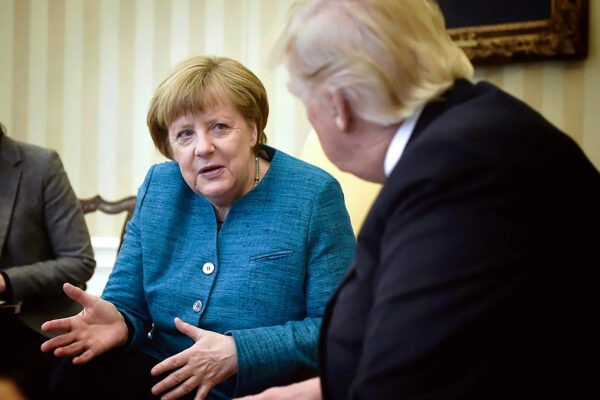
American president Donald Trump reportedly presented Germany’s chancellor, Angela Merkel, with a $374 billion invoice for missed contributions to NATO when she visited Washington DC earlier this month.
As first reported by The Times, Trump arrived at the figure by calculating how much Germany has fallen short of NATO’s 2-percent defense spending target since 2002 and then adding interest.
A German official described the move as “outrageous” to The Times. Merkel ignored it.
It’s hard to imagine a previous president treating an ally so cruelly, but the story is not at all unbelievable given what we know about Trump: that he humiliates people, is intimidated by powerful women and sees international relations in transactional terms.
After meeting with Merkel — and refusing to shake her hand for the cameras — Trump took to Twitter to complain:
Germany owes vast sums of money to NATO and the United States must be paid more for the powerful, and very expensive, defense it provides to Germany!
This view is misguided.
Reversal
Germany never asked for American troops on its soil. America itself decided after World War II to act as Germany’s protector in order to discourage German militarism.
As the alliance’s first secretary general, Hastings Ismay, famously put it, the purpose of NATO was threefold: “keep the Russians out, the Americans in and the Germans down.”
In friendlier terms: NATO, and later the EU, were designed to pacify Germany. By ensconcing the country in a pan-European economic and a transatlantic security structure, it would neither need nor be able to wage war in Europe again.
Throughout the Cold War, the United States maintained a massive military presence in Germany. It wasn’t until 1991 that it relinquished its territorial claims in the country. To this day, Germany is bound by treaty to keep its defense force under 370,000 men.
What Trump is calling for is a reversal of decades of American policy toward Germany.
Of course, America has the right to change its mind. But it’s not reasonable to expect Germany to completely revise its defense policy just because the Americans have had a change of heart.
Proxy for loyalty
Trump is also mistaken in seeing 2-percent spending target as a proxy for loyalty.
Few allies meet the target, which until a few years ago was only a guideline. Yet many fight in America’s wars and contribute to American-led stability operations.
Greece is one of the few countries that meets the 2-percent target. But it contributes virtually nothing to NATO operations worldwide.
Northern and Western European countries, by contrast, spend less than 2 percent of their gross domestic products on defense but help patrol the Mediterranean and the Gulf of Aden against smugglers and pirates, bomb Islamic State targets in Iraq and train soldiers in Afghanistan.
Surely that’s more helpful? Their actions allow the United States to reallocate resources to the Pacific. Allies that spend 2 percent on defense but keep their troops at home do nothing to share the burden.
